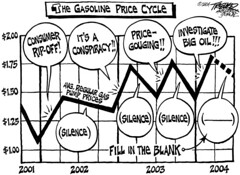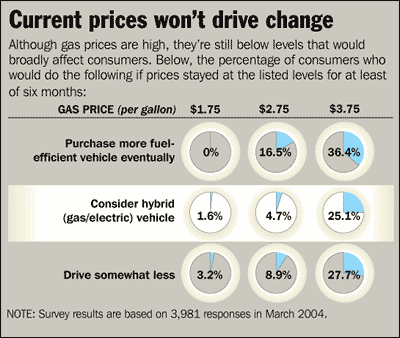Rise in gas prices cuts spending, not driving
 Who's responsible for this outrage? Not me! Cartoon by John Trever, New Mexico, The Albuquerque Journal.
Who's responsible for this outrage? Not me! Cartoon by John Trever, New Mexico, The Albuquerque Journal.According to a new study for the National Retail Federation by BIGresearch, 66.2% of consumers, or 145.3 million Americans, believe that fluctuating gas prices have impacted their spending habits, up from 56.8 percent in 2004. Despite a recent drop in gas prices, the report says, consumers continue to alter their spending to compensate for high numbers at the pump.
Tracy Mullin, NRF President and CEO, said "While shoppers seem to be getting over the initial sticker shock, gas prices have taken a long-term toll on consumers, many of whom have had to adjust their spending to compensate for the increases. Every penny spent on gasoline is a penny kept from retailers, so this is also a very real problem for our industry."
According to the NRF 2005 Gas Prices Consumer Intentions and Actions Survey:
• 68.5 million people (31.2% of consumers) have decreased vacation or travel plans
• 25.2% have been dining out less frequently
• 23.7% spending less on clothing
• 17.3% spending less on groceries
• 35.9 million consumers (16.4%) have delayed purchases of cars and furniture as a result of higher gas prices
• But only 5.7% of consumers increased carpooling
• 35.1% of consumers polled said that gas prices would affect their Memorial Day spending
• 69.9% of consumers with household incomes under $50,000 say they have felt an impact from rising gas prices
• 58.2% with household incomes over $50,000 have also been affected.
(Additional breakdowns and details are available on the NRF website.)
"High gas prices have become a way of life for consumers, and they are adjusting as much as they can," said Phil Rist, Vice President of Strategy for BIGresearch.
_________
 AP graphic from 2004, from the Christian Science Monitor.
AP graphic from 2004, from the Christian Science Monitor.This 2005 survey certainly confirms the conclusions of this article from April 2004, "Despite high gas prices, Americans keep on driving: Fuel will have to top at least $2, if not $3, for drivers to change their behavior."
This roundup of editorial cartoons from last year is pretty pathetic, calling oil companies extortionist (granted they are making record record profits) while exonerating any responsibility on the part of the Asphalt Nation.



0 Comments:
Post a Comment
<< Home